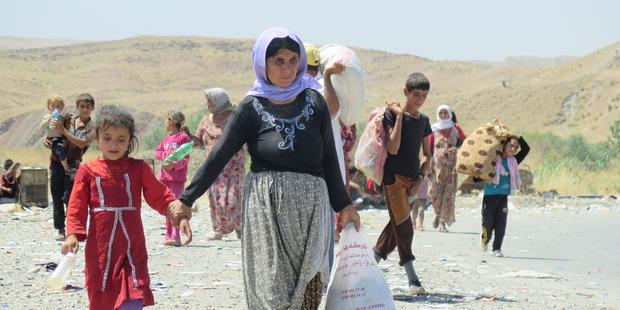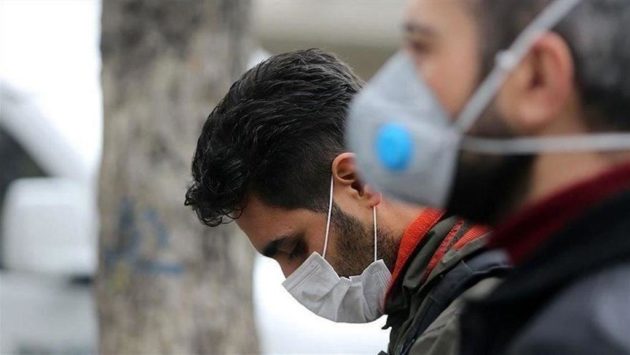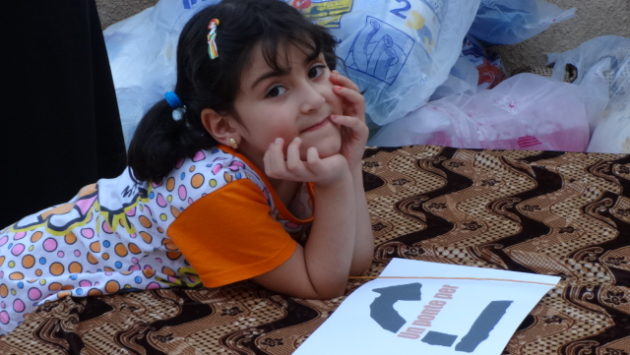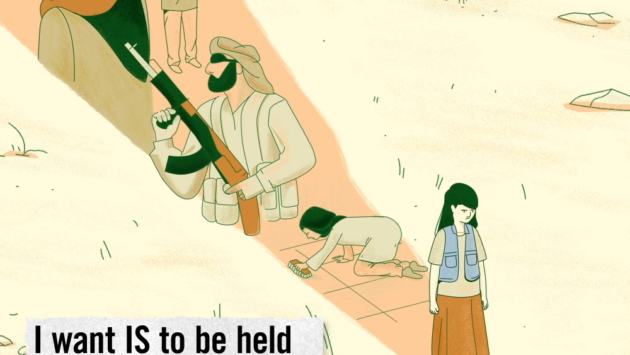ETHNIC CLEANSING ON HISTORIC SCALE: THE ISLAMIC STATE’S SYSTEMATIC TARGETING OF MINORITIES IN NORTHERN IRAQ
September 2014
The group that calls itself the Islamic State (IS) has carried out ethnic cleansing on a historic scale in northern Iraq. Amnesty International has found that the IS has systematically targeted non-Arab and non-Sunni Muslim communities, killing or abducting hundreds, possibly thousands, and forcing more than 830,000 others to flee the areas it has captured since 10 June 2014.
Ethnic and religious minorities – Assyrian Christians, Turkmen Shi’a, Shabak Shi’a, Yezidis, Kakai and Sabean Mandaeans – have lived together in the Nineveh province, much of it now under IS control, for centuries. Today, only those who were unable to flee when IS fighters seized the area remain trapped there, under threat of death if they do not convert to Islam.
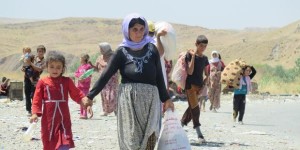
Hundreds, possibly thousands, of Yezidis, most of them women and children from the Sinjar region, were abducted as they fled the IS takeover in early August. At the time of writing, they continue to be held by the IS and, with a few exceptions, little is known of their fate or whereabouts. Some of those who managed to make contact with their families said they are being pressured to convert to Islam and some have reported that some of the women and children – both girls and boys – from their families were taken to unknown locations by their captors. Some families say their detained relatives have also told them there have been cases of rape and sexual abuse of detained women and children.
Lawyer Mirze Ezdin is among those desperately awaiting news of his family. After patiently listing the names and ages of 45 relatives – all women and children – abducted by IS fighters in Qiniyeh, he showed Amnesty International a photo of two of his nieces on his mobile phone. Struggling to hold back the tears, he said:
“Can you imagine these little ones in the hands of those criminals? Alina is barely three; she was abducted with her mother and her nine-month-old sister; and Rosalinda, five, was abducted with her mother and her three brothers aged eight to 12. We get news from some of them but others are missing and we don’t know if they are alive or dead or what has happened to them.”
Hundreds of Yezidi men from towns and villages in the Sinjar region, which put up armed resistance in a bid to repel the IS advance, were captured and shot dead in cold blood, scores in large groups, others individually, seemingly in reprisal for resisting and to dissuade others from doing so. It is from these towns and villages that most of the women and children were abducted.
Scores of Yezidi men who were captured on 3 August, when IS fighters stormed the Sinjar region, were shown converting to Islam in a video distributed on social media around 20 August, in which an IS commander says that those who do not want to convert can die of hunger and thirst “on the mountain” (a reference to Mount Sinjar, where Yezidi fighters and some civilians have been sheltering since 3 August, surrounded by IS fighters). There is little doubt that those shown in the video converted to save their lives and in the hope of being freed. However, even those who converted have so far not been allowed to leave.
Although the overwhelming majority of the people of these minority communities managed to flee before IS fighters reached their towns and villages, they escaped with their lives and nothing else. They had to leave their homes and everything they owned behind and even the little they could carry – especially money and jewellery – was often taken from them by IS fighters manning checkpoints on the perimeters of the areas they control. Their homes have since been appropriated or looted by IS fighters and their supporters among the local Sunni population, and their places of worship destroyed.
While the IS has mainly targeted the minority communities, many Arab Sunni Muslims known or believed to oppose the IS or to have worked with the government and security forces, or previously with the US army (present in Iraq until 2011), have likewise been forced to flee to avoid being killed, and their homes have been appropriated or destroyed.
Since 10 June, more than 830,000 people, have been forced from their homes in IS-controlled parts of northern Iraq, resulting in a humanitarian crisis which prompted the UN to declare its highest level of emergency on 14 August. Most of the displaced are sheltering in the semi-autonomous region of Iraqi Kurdistan, under the control of the Kurdistan Regional Government (KRG), with small numbers sheltering across the borders in Syria and Turkey.
The humanitarian conditions for the overwhelming majority of the hundreds of thousands of displaced are dire – lacking shelter, many sleep in building sites, makeshift encampments and parks with no sanitation, others in schools, halls and other public buildings. KRG officials have admitted that they are overwhelmed and unable to cope, while the response of the international community has been slow and inadequate, though the UN’s recent designation of the crisis as its highest level of emergency should result in prompter action from the relevant international humanitarian agencies.
The forced displacement of Iraq’s ethnic and religious minorities, including some of the region’s oldest communities, is a tragedy of historic proportions. Amnesty International’s field investigations have concluded that the IS is systematically and deliberately carrying out a program of ethnic cleansing in the areas under its control. This is not only destroying lives, but also causing irreparable damage to the fabric of Iraq’s society, and fuelling inter-ethnic, sectarian and inter-religious tensions in the region and beyond.
Entire communities in large swathes of territories in northern Iraq were abandoned to their fate without protection from attacks by the IS when the Shi’a-dominated Iraqi army and security forces fled the area in June.
The scale and gravity of the abuses and the urgency of the situation demand a swift and robust response – not only to provide humanitarian assistance to those displaced and otherwise affected by the conflict but also to ensure the protection of vulnerable communities who risk being wiped off the map of Iraq.
States have an obligation to provide equal protection to all communities within their borders. Successive Iraqi central governments have failed to do so. Further, they have contributed to the worsening of the situation in recent months by tolerating, encouraging and arming sectarian militias, in particular Shi’a militias in and around the capital, Baghdad, and in other parts of the country. In responding to the current crisis, the Iraqi central government and the KRG (whose armed forces now control some of the areas abandoned by the Iraqi army) must prioritize measures to ensure the protection of the civilian population regardless of religion or ethnicity.
The new Iraqi central government, whose formation is currently being negotiated, must prioritize the establishment of non-sectarian government, military and security institutions that are both willing and able to restore security and the rule of law and to provide protection and recourse for all sectors of the population without discrimination. At the same time, it should disarm and disband militias responsible for extrajudicial executions and other gross violations and bring perpetrators to justice.

